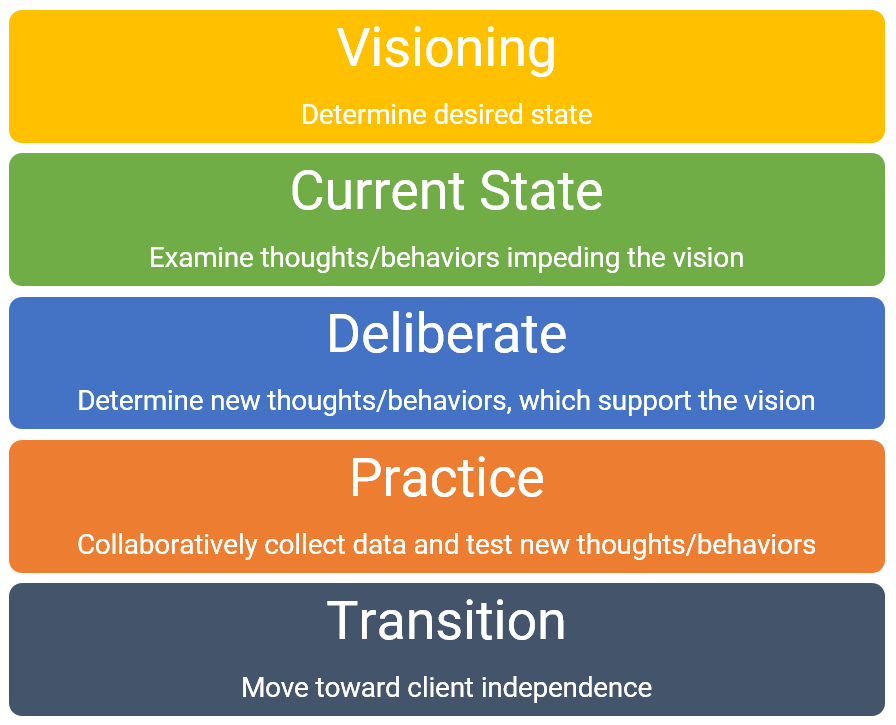Executive Coaching

Executive coaching is the practice of helping leaders learn about themselves and others and transfer that learning into results for the organization. Although there are an abundant number of outcomes that can result from executive coaching, most researchers suggest six categories:
The seventh category often mentioned is skill or ability building. Frankly, I see skill and ability building as methods to achieve the above outcomes. When someone says, “I want to increase my communication skills.” I ask, “why?” Inevitably, their reasoning aligns with one of the six categories.
Each category is unique to each individual. Their unique experiences and genetic material create a lens through which they interpret these words and make their own meaning and judgments. And, if they are open to changing that lens and considering alternatives, they can change their reality. The concept is both powerful and frightening in that we have so much independence on how we choose to live and approach any given moment. The path forward is ours to choose.
SOLVE coaches are Industrial/Organizational Psychologists, with specialized training in leadership and human behavior in the workplace. They utilize a cognitive behavioral approach blended with goal setting to “re-program” and optimize overall thinking. As a result, leaders recognize and execute more effective behaviors and thinking styles, which lead to improved performance.
Executive coaching is a great support for leaders in transition after a promotion, on-boarding a new executive, or addressing performance issues.
The goal of executive coaching is long-term integration of effective leadership behaviors. And research indicates sustainable behavior change is more likely to occur with 6 to 12 months of focused coaching.
What do our clients say?
“SOLVE experts listen first and develop a deep knowledge of the organization and our culture. We know that each organization and individual are unique. Their experts think through the interpersonal dynamics in such a way that provides us with insight, and then develop practice strategies tailored to our company and our leaders.”
– Eric, Chairman & CEO, Engineering & Architecture Industry
Cognitive Behavioral Executive Coaching (CBEC) is based on the tenets of Cognitive Behavioral Therapy (CBT), developed by renowned psychologist Aaron Beck in the 1960s and popularized by David Burns in his best-selling book, Feeling Good: The New Mood Therapy.
CBEC translates those proven therapeutic methodologies for use in a corporate setting. As organizational psychologists, we are not therapists; we neither diagnose nor treat psychological dysfunction. Instead, we are hired to support leaders toward increased effectiveness.
The advantages to this approach are two-fold: greater sustainability of new behaviors in less time. Because you are re-programming the way you think, changes become easier to maintain. Most leaders are least effective under stress because the prefrontal cortex gets hijacked by the amygdala and negative, dysfunctional, intuitive thinking dominates. Leaders who learn to address that “negative voice” in a rational manner can acknowledge its presence and consider alternatives.
While it takes considerable time to master these skills and re-program the brain, gaining self-sufficiency in these skills occurs, on average, in 14 coaching sessions. For most of our clients, that’s seven months. And the wonderful benefit with CBEC is behavioral changes can be anticipated after the first session, due to the practical nature of this approach.
Having said that, Cognitive Behavioral Executive Coaching is one of many approaches our coaches utilize. It may not work for everyone, or for all needs. And that is why it is important for a coach to have a breadth of expertise and training from which to consider.

Although no two relationships are the same, this process serves as a general overview of our approach to executive coaching. Adapted from Cognitive Behavioral Executive Coaching: A Structure for Increasing Leader Flexibility.
Coaching sessions are based on a schedule developed between the coach and the leader. Initially, coaching sessions are more frequent and become less frequent as leadership skills and strategies become integrated. Each relationship is different and our coaches encourage and promote an individualized approach.
Of course! Although CBEC is foundational, every relationship calls for an individual approach based on the needs of both the leader and the business.
Other methods include, but are not limited to:
Performance coaching | teaching leadership fundamentals, increasing ambition, visualization, goal-setting, and execution.
Social psychology | developing emotional intelligence, executive presence, increased awareness of social surroundings and pressures, identifying biases
Systems thinking | identifying the root problem, understanding context, process over content, focus on the present.
Behaviorism | creating behavior reinforcement strategies, identifying small actions that lead to big change.

Research shows one of the most critical predictors of coaching success is the ability for the coachee to have a productive rapport with their coach.
Because we strive for successful outcomes, we provide background information and introductory conversations with SOLVE coaches so you can determine which coach is best suited for your needs.
Bad coaching is widely available, wastes resources, and often leaves the business in worst shape then before. Be an informed consumer and seek qualifications – there is no accepted certification in executive coaching like there is in medicine, accounting, etc. This article, The Wild West of Executive Coaching, is a good resource as you evaluate options.
Curious to learn more? Meet our Executive Coaches.